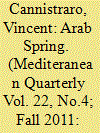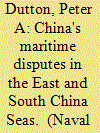| Srl | Item |
| 1 |
ID:
111253


|
|
|
|
|
| Publication |
2011.
|
| Summary/Abstract |
The Arab Spring has affected interests of the Western democracies in the Middle and Near Eastern nations, and the instability will compel changes in American policies for the region. There have been political revisions and in some cases nontraditional modifications in moribund autocracies and dictatorships across the Arab world, reaching to the Arab and Persian Gulfs. The awakening has been enervated by violent responses from more cohesive and profound dictatorships in Syria and Libya, but the "leaderless" model of the awakening can quickly bring together disparate groups working toward a common goal. As the process across the Arab world unfolds, American interests will need to be addressed in ways different from the past. New American wars will not be a promising option. The region's challenges require a serious and consistent policy toward resolving the core issues of instability, and that includes overcoming domestic opinion and lobbies that work against a two-state solution for Israel and Palestine. The current demographic prospect is that Israel will lose its Zionist hopes by the forced integration of Palestinians who have lost their own hope of a viable and independent nation.
|
|
|
|
|
|
|
|
|
|
|
|
|
|
|
|
| 2 |
ID:
133060


|
|
|
|
|
| Publication |
2014.
|
| Summary/Abstract |
China pursues its security through interior strategies that involve the development of rings of security around central areas of national interest. The Chinese have long felt vulnerable from the sea, and their current maritime strategy seeks to reduce that vulnerability by extending a ring of maritime control around China's periphery. China pursues this control through a combination of forcestructure development and legal assertions. Tensions arise because China's strategy conflicts with the territorial claims, resource interests, and security concerns of other states in East Asia. China's strategy also causes friction with the United States, which relies on freedom of navigation in maritime East Asia for American security interests and which must reassure regional allies and partners that American security guarantees are meaningful. In order to ensure the position of the United States in East Asia, American policies must focus on maintaining the region as an open, maritime system. This requires continuous development of technological advantages to ensure that the center of power in Asia does not migrate from the maritime domain to the continent. It also requires the United States to support the ability of allies, friends, and partners to resist China's nonmilitarized coercion, as well as to reinforce the normative structure that supports the efficacy of maritime power in the region and around the globe.
|
|
|
|
|
|
|
|
|
|
|
|
|
|
|
|